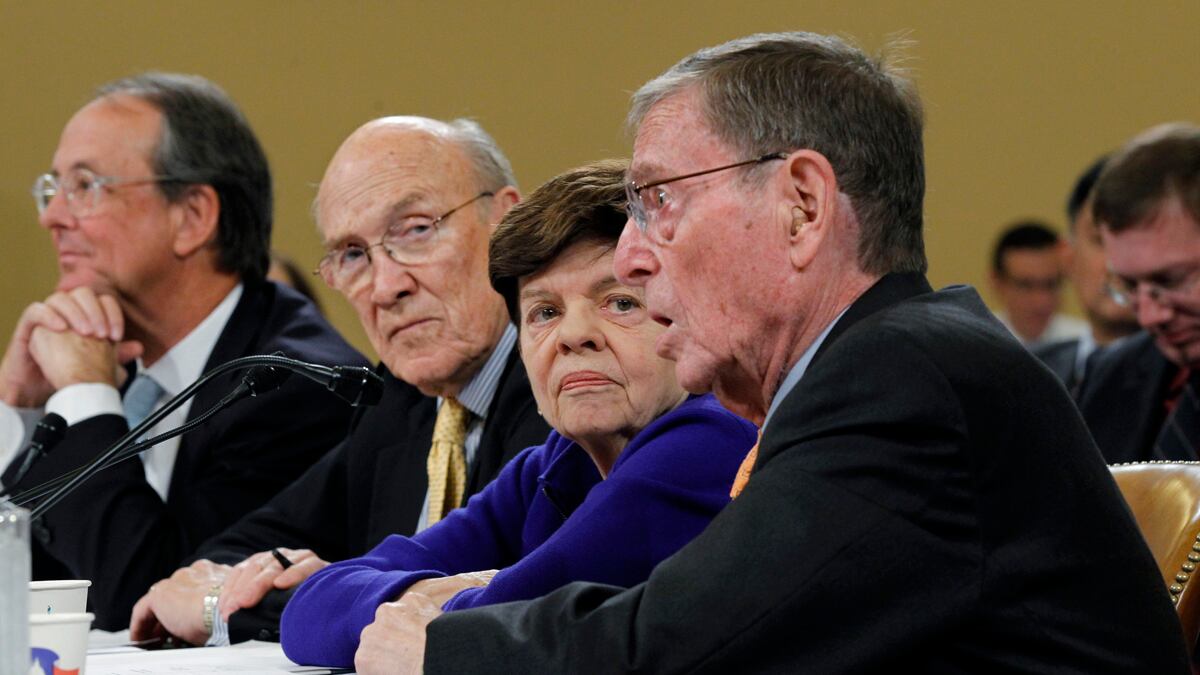Despite the widespread expectation of failure by the congressional supercommittee charged with finding at least $1.2 trillion in deficit reduction, there is an emerging view that a deal is within reach. This nascent optimism rests on the notion that the 12 members appointed to the committee have a stake in succeeding, and that the two political parties are not that far apart—assuming the GOP can find some verbal elocution around the antitax pledge 95 percent of congressional Republicans have signed.
In what was likely the committee’s last open hearing before its Nov. 23 deadline, the architects of two well-publicized road maps (Simpson-Bowles and Domenici-Rivlin) chided the committee for Congress’s inability to tackle the nation’s growing and unsustainable debt. “I have great respect for each of you individually, but collectively, I’m worried you’re going to fail—fail the country,” said former Clinton chief of staff Erskine Bowles.
The self-described fiscal conservative outlined a new $2.6 trillion solution that splits the difference between rival Republican and Democratic plans. Bowles said the plan “would create excitement in the country and confidence that we can stand up to our problems.”
Committee co-chair Jeb Hensarling, a Republican from Texas, dryly noted that the plan created excitement in the press, but he appeared unmoved. Bowles included in his calculations $800 billion in revenue and tax increases that Speaker John Boehner had identified in private talks with President Obama during last summer’s debt-ceiling crisis. Boehner pulled out of the talks when it became apparent that Republicans wouldn’t back any agreement that contained added revenue.
At the White House on Wednesday, Press Secretary Jay Carney fielded several questions from reporters wanting to know why Obama wasn’t more directly engaged with Republicans to find a compromise. Carney said he didn’t think many Americans outside the White House press room were eager to see another meeting between the president and Boehner. “The solutions here are not complicated,” he said. “What it takes is political will.”

Truth is, there isn’t a direct role for Obama with the supercommittee, which is a Congress-mandated body whose goal is to recommend a deficit-reduction proposal backed by a majority of its 12 members. Obama can affect the overall political climate in which the committee operates, and his repeated calls for a balanced approach to deficit reduction that would call on the wealthiest Americans to pay a bit more is resonating in the polls not only among Democrats, but also with Republicans and independents.
The antitax phobia that has taken hold of the GOP remains the biggest obstacle to reaching a deal. “They have all drawn lines in the sand that they don’t want to cross,” says Matt Bennett of Third Way, a centrist Democratic group. “But the Republicans have concrete lines with these crazy pledges.” Antitax activist Grover Norquist remains at the center of the battle, with his view that even closing a tax loophole for a special interest, such as the oil companies, counts as a tax increase. Former Republican senator Alan Simpson, coauthor with Bowles of the Simpson-Bowles deficit-reduction plan, called Norquist’s definition “criminological inexactitude,” in other words, said the crusty ex-senator, “a lie.”
Bennett is among those in Washington who think the supercommittee could come through and buck the leadership, especially on the Republican side. “These guys do not want to fail,” he said. There is a lot of pressure to “go big” and find $3 trillion to $4 trillion in deficit reduction; they may not get there, but reaching the $1.2 trillion minimum shouldn’t be that hard, with several plans under consideration, all with a familiar ring by now, and all calling for entitlement cuts that Democrats appear poised to make, and revenue, which Republicans are still resisting.
If the supercommittee can muster a simple majority—seven votes—then it’s the leadership’s problem to find a simple majority in the House and Senate. No filibuster, no gamesmanship, a nice, clean vote—something Congress rarely does. Bowles, a former businessman, found middle ground by increasing the spending cuts he and Simpson originally had proposed and reducing the amount of revenue their plan called for, concessions to the GOP that brought howls from Democrats.
Should the impasse prove too great for mere politicians to surmount, automatic cuts in domestic discretionary spending and defense spending would go into effect—but not until 2013. Congress would have a year to fix what they’re calling “the time bomb,” and in the world of politics, that’s an eternity.





